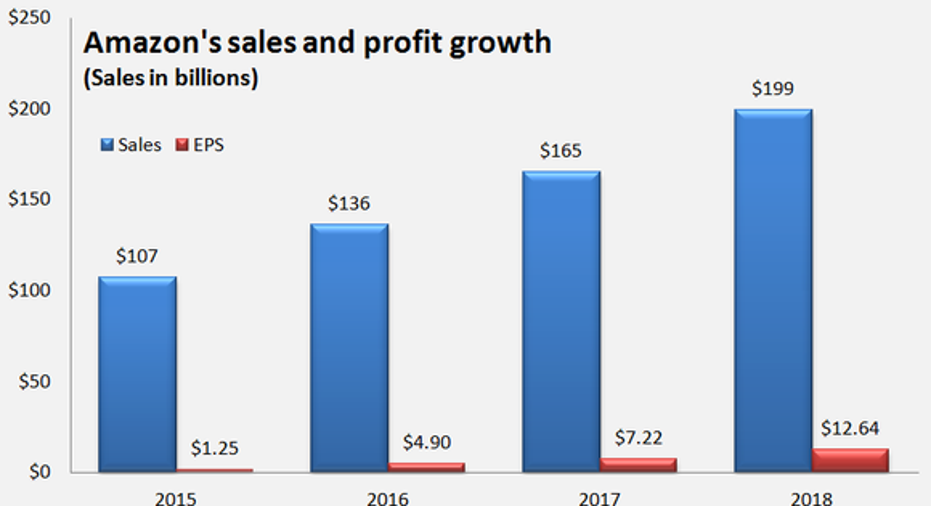3 Perfect Stocks You Can Buy Now

Rapid top- and bottom-line growth, bullet proof balance sheets, and innovation-first management teams make Amazon.com (NASDAQ: AMZN), Facebook (NASDAQ: FB), and Celgene Corp.(NASDAQ: CELG) incredibly intriguing stocks to buy in portfolios.
A forest of opportunity
Amazon.com is dominating online retail, yet its sales would need to nearly triple to match bricks-and-mortar giant Wal-Mart Stores, and investments in innovation could help this company become much, much bigger in the coming decade.
IMAGE SOURCE: GETTY IMAGES.
In the past year, Amazon's sales surged 27% higher to $136 billion, and this year, industry watchers think that Amazon's revenue could jump again to $165 billion.
Driving the company's growth is CEO Jeff Bezos unwavering focus on new products and services that can make Amazon more meaningful to consumers. Thanks to Bezos vision, Amazon Prime has become a leading source for consumer entertainment, and Amazon's devices, including tablets and, more recently, virtual assistants, are providing increasingly more ways for Amazon to cozy up with consumers.
As Amazon introduces increasingly more relevent products and solutions to consumers, and it discovers new ways to deliver those solutions more quickly, I believe its bottom-line will soar. Already, we're seeing evidence of this. Net income grew far more quickly than revenue last year, and as higher revenue is leveraged against fixed costs, that trend should continue. I'm not alone in that thinking. Industry watchers believe Amazon's sales will grow more than 20% in both 2017 and 2018, and they forecast EPS growth will double and triple their sales growth projections, respectively.
AUTHOR'S CHART.
Cashing in on connections
Facebook can't have any more room for growth, can it? After all, you have to try pretty hard to find someone that's unfamiliar with the social media Goliath. Yet, CEO Mark Zuckerberg thinks his company's monthly active users can more than double fromabout 2 billion today to 5 billion by 2030.
Resting on Facebook's laurels won't help him hit that target, so Zuckerberg's committing big money to expanding Facebook's services into adjacent markets, such as messaging, video, search, and gaming. Zuckerberg's acquisition of Oculus VR, and rumors of forthcoming consumer electronics devices suggest that Facebook plans on riding tailwinds associated with next-generation technology too, including the Internet of Things.
While those investments ingrain Facebook more deeply into current user's lives, big picture projects, such as delivering Wi-Fi to far flung regions of the world, introduce Facebook to new, heavily populated markets, like Africa.
Funding all of these projects isn't cheap, butFacebook's massive size means it's got the financial firepower necessary. The company's sales surged 57% to $26.9 billion in 2016, and momentum has folks pegging revenue of $37.9 billion in 2017. Net income jumped an eye-popping 177% to $10.2 billion in 2016, and if the company hits sales targets this year, EPS could climb to $5.42 from $3.49 in 2016.
Only time will tell if Facebook's user base grows the way Zuckerberg hopes it will, but given his track-record, a massive installed base already, and an increasingly attractive income statement, I'm betting on him, not against him.
Game-changing drug development
The biotech industry is notoriously hit and miss, but Celgene's track record has undeniably been dominated by the former. Celgene established itself as a biotech leader when it launched the multiple myeloma drug Revlimid in 2005, and today, Revlimid is one of the world's top selling drugs. It's the market-share leading first- and second-line therapy used in the indication, and research that's expanded its use to more patients translated into $7 billion in sales in 2016.
Over the years, Celgene's successfully added not one, but three additional blockbusters to its product portfolio. In 2012, it launched the lung cancer and pancreatic cancer drug Abraxane, in 2013, it launched the third-line multiple myeloma drug Pomalyst, and in 2014, it launched the psoriasis drug Otezla. Last year, sales of those drugs totaled $973 million, $1.3 billion, and $1 billion, respectively.
Soon, Celgene may be able to count two more drugs as top-sellers. Earlier this year, management reported results from a clinical trial of ozanimod in multiple sclerosis that were impressive, and the FDA is already reviewing a new leukemia drug -- enasidenib -- that Celgene co-developed with Agios. If ozanimod wins FDA approval next year, its arguably best-in-class safety could propel it to one billion dollars in sales quickly. Meanwhile, a decision on enasineb is expected on Aug. 30, and that means Celgene could add a new source of sales as soon as the third quarter of 2016.
Given the company's R&D prowess (and its high-profile collaborations), it's not surprising that management's got high hopes for revenue and profit growth. This year, it's forecasting sales will climb 18% to at least $13 billion in 2016. It also thinks EPS will jump 21% to $7.10. That's impressive growth, but even more impressive is management's outlook for 2020. While regulatory rejections or trial failures could derail its forecast, it's targeting sales of over $21 billion and EPS of over $13 that year. With an outlook like that, it seems smart to be shareholder.
10 stocks we like better than CelgeneWhen investing geniuses David and Tom Gardner have a stock tip, it can pay to listen. After all, the newsletter they have run for over a decade, Motley Fool Stock Advisor, has tripled the market.*
David and Tom just revealed what they believe are the 10 best stocks for investors to buy right now... and Celgene wasn't one of them! That's right -- they think these 10 stocks are even better buys.
Click here to learn about these picks!
*Stock Advisor returns as of April 3, 2017
Todd Campbell owns shares of Amazon, Celgene, and Facebook. His clients may have positions in the companies mentioned.The Motley Fool owns shares of and recommends Amazon, Celgene, and Facebook. The Motley Fool has a disclosure policy.



















